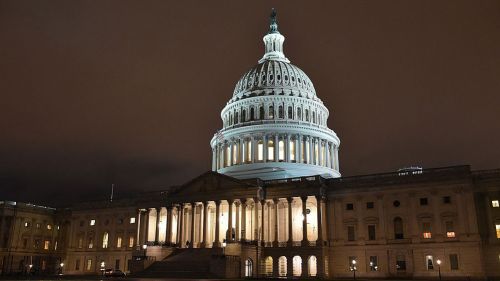Will Ambassador Subnat Go to Washington?

The proposed "City and State Diplomacy Act" would establish an ambassador for subnational engagements by state and municipal governments.
The City and State Diplomacy Act
On June 28, 2019, Congressmen Ted W. Lieu (D-CA33) and Joe Wilson (R-SC02) introduced H.R.3571, the "City and State Diplomacy Act." The Act seeks to mandate a senior official at the State Department charged with “supervision (including policy oversight of resources) of Federal support for subnational engagements by State and municipal governments with foreign governments.” The position would be at the ambassadorial level, and "Ambassador Subnat" would require the consent of the Senate to oversee a new Office of Subnational Diplomacy.
The State Department has been grappling for years with how to adapt its structure to an increasingly urban world. The Obama administration adopted two approaches. From 2010-2013, Reta Jo Lewis served as the special representative for global intergovernmental affairs. Lewis and her office advanced a number of MOUs with cities in strategically important countries such as Brazil and China. That office was eventually folded into the Bureau of Public Affairs, with its attention directed towards US cities under the leadership of Karen Richardson. Towards the latter end of the Obama administration, I served as the senior adviser for global cities, with a focus on network engagement, negotiating in multilateral fora, and supporting State Department bureaus, embassies, and the interagency in engagement with cities abroad.
The various bureaucratic constructs speak to the difficulty of organizing for subnational diplomacy. Should Ambassador Subnat be a diplomat building relationships abroad or a policy wonk supporting officials in Washington? Is global urbanization an economic phenomenon, in which case Ambassador Subnat might report to the undersecretary of economic growth, energy, and the environment? Or is this an opportunity for winning hearts and minds in new ways, in which case they might report to the undersecretary for public diplomacy and public affairs?
The answer might be "all of the above." It is important to have an official practiced at engaging mayors, but it is also crucial to use the well-established system of embassies and consulates to do so. The growth of urban economies provides an opportunity to advance US economic interests, while the citizen diplomats and mayors of our cities can offer a more diverse face of the United States abroad.
But "all of the above" is not bureaucratic answer. In drafting the City and State Diplomacy Act, Congressional staff consulted widely (I was one source of input) and ultimately had to come to a decision about some of these trade-offs. As such, a couple of points stand out:
- First, in Washington, Ambassador Subnat would report to the undersecretary of political affairs, situating their office in the strongest undersecretariat in the State Department, and the one charged with maintaining direct diplomatic relationships through embassies. Such a location would fit with the argument made by global cities scholar Simon Curtis that the rise of global cities is a political phenomenon, and with the recognition that many mayors rise to national level positions.
- Second, as for diplomatic engagement beyond Washington, Ambassador Subnat would work with and support US cities. Perhaps the most noteworthy shout out for relationship building is to the networks, such as C40 Cities and the Global Covenant of Mayors for Climate and Energy, for which no further proof that they are global diplomatic players was needed.
- And finally, there is the bipartisan nature of the Bill and its title itself. It is not a City Diplomacy Act but the "City and State Diplomacy Act." Given that Republicans hold a majority of gubernatorial seats and Democrats the reins of power in most major city halls, it’s not hard to imagine that the candidates to be Ambassador Subnat, as well as the focus, might shift from administration to administration.
In the end, the success of an Office of Subnational Diplomacy at the Department of State would hinge on the appointee and their ability to influence policy development, build diplomatic relationships, and work within a sometimes archaic bureaucracy. That, after all, is why histories of our great diplomats are also histories of our foreign policy bureaucracy.
This year has already seen the publication of two essential works on diplomacy: Ambassador William Burns's memoir, The Back Channel: A Memoir of American Diplomacy and the Case for Its Renewal, and journalist George Packer’s biography of the late Richard Holbrooke, Our Man: Richard Holbrooke and the End of the American Century. Many of the central and supporting characters in these two books are the same. These include presidents, prime ministers, and autocrats, but also the vast bureaucracy of the State Department and interagency that implements, and at times shapes, American foreign policy. The Back Channel and Our Man are essential reading on foreign policy not only because they offer portraits of two leading diplomats of the last three decades, but because they also offer biographies of our bureaucracy.
Gripping stuff, I know. No winner of the Pulitzer Prize has taken bureaucracy as their subject. And to be sure, Holbrooke’s interagency infighting falls a distant second to his tête-à-têtes with Slobodan Milošević or his power lunches at the Four Seasons restaurant in terms of Page Six diplomatic portraiture. But the shape of the foreign policy apparatus matters, which is why, probably even despite the objections of their editors, Burns and Packer spend time thinking and writing about it seriously. And why the City and State Diplomacy Act is relevant.
While the malpractice of diplomacy dominates today’s news cycles, the better practices of the craft also continue by the day. Want evidence? Listen to Burns. Or cue Packer: "We think of bureaucrats as colorless mediocrities performing mediocre tasks, but I’m using the word with high respect. Most of us have no idea how much talent and honor and toil lie buried in the mid-century concrete mausoleums of the federal government scattered around Washington."
Whether the City and State Diplomacy Act is passed, or gets any further attention at all, is yet to be seen. All the same, take note of national leaders working creatively and proactively to evolve bureaucratic systems for a world in which cities are ever more active in global affairs.

